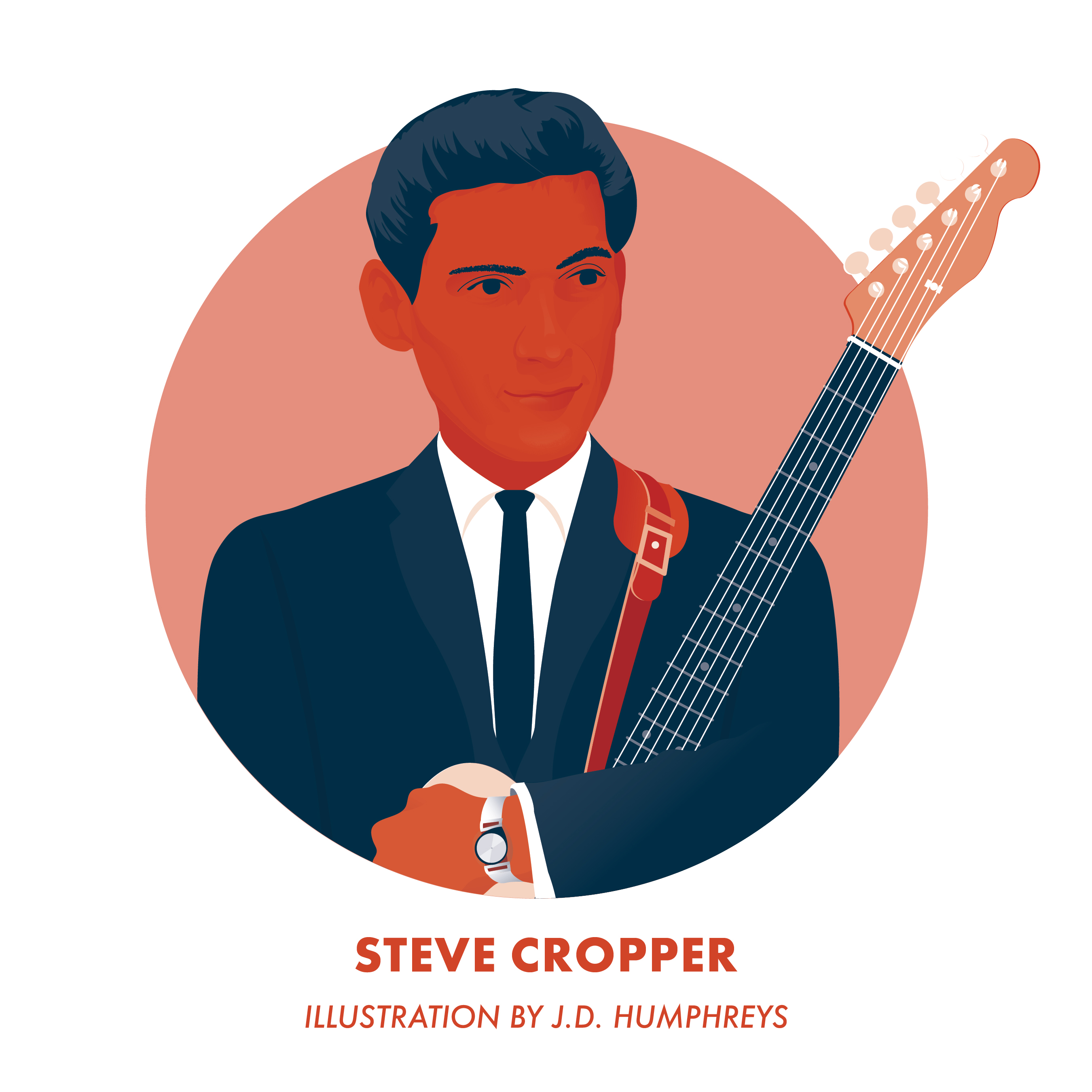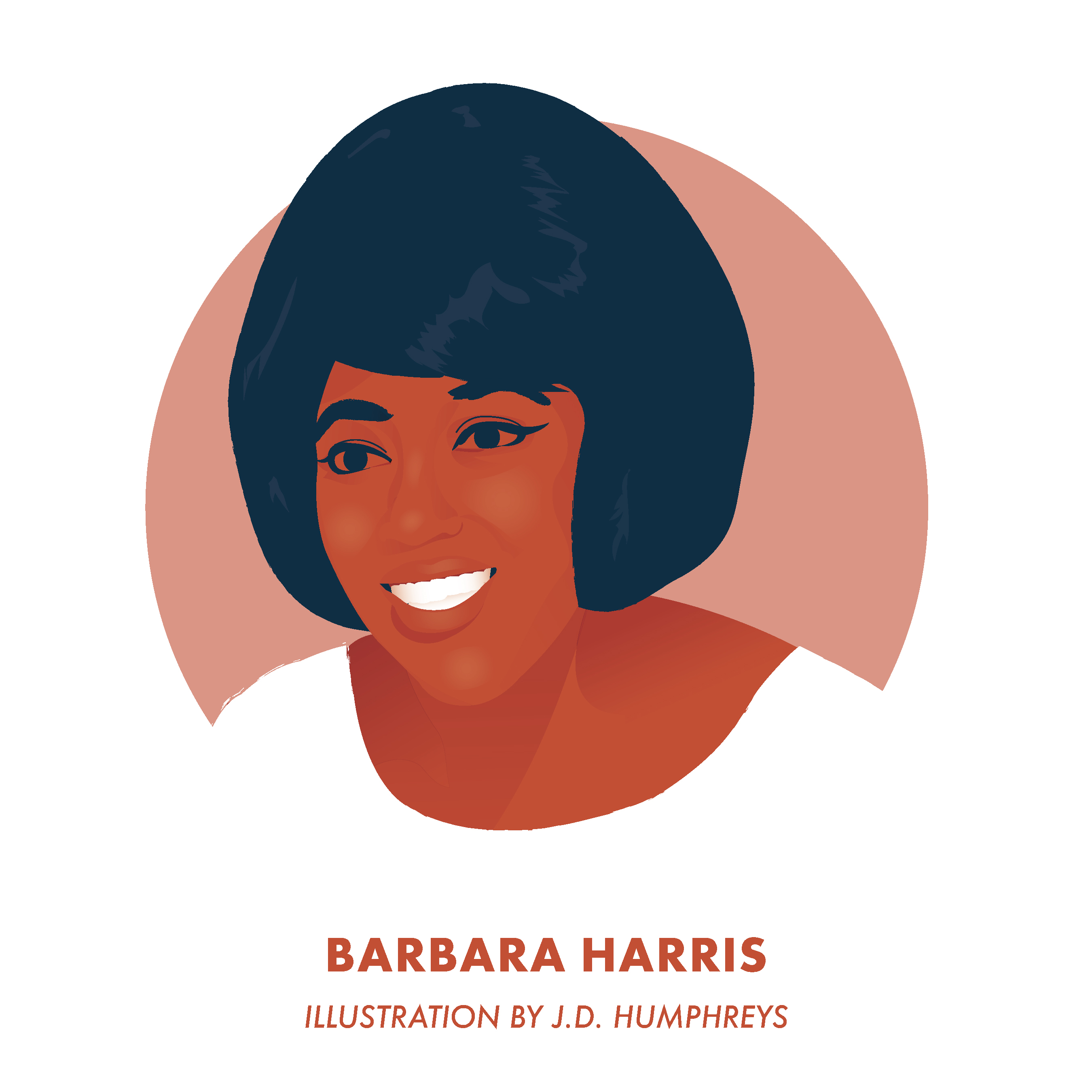Part 3—Harmonies Amid Hostility
When “Green Onions” by Booker T. & the MGs started picking up steam, Stax Records knew they had something special on their hands—even if it didn’t seem that way at first. Released as a B-side on their Volt label, radio DJs were bypassing the A-side track, “Behave Yourself,” in favor of the infectious groove of “Green Onions.” Soon, the record exploded, leaving the label scrambling to meet the demand. Stax co-founder Jim Stewart recalled, “It broke overnight and we couldn’t get the records out fast enough.” Airplay lit up across stations in Memphis like WLOK and WDIA, but it didn’t stop there. Steve Cropper personally drove the growing hit through Arkansas, Alabama, and Mississippi, gaining momentum as it hit new markets. Word even reached Jerry Wexler in New York, who saw the potential and urged Stax to reissue “Green Onions” on the A-side, moving it from Volt to Stax to ride the wave of its growing success.
Booker T. Jones of Booker T. & the MGs. Illustration by J.D. Humphreys
• “GREEN ONIONS” SPROUTS A FAN BASE FOR BOOKER T. & THE MGs •
With Atlantic's backing, "Green Onions" shot to the top of the R&B charts, claiming the number one spot, while also climbing to an impressive number three on the pop charts. “It was popular on R&R charts, R&B charts, and even made some jazz charts,” Booker T. Jones remarked. “I think a good deal of the record’s popularity was due to an extremely diversified listening audience!” Jones would also remark, “We were a band that started something new. So, every record had to be fresh, or it was no good. We couldn’t redo ‘Green Onions’ because that was a new song, it was a new rhythm. We had to come up with another one, had to keep doing that.”
 Jones points out the new rhythm in “Green Onions,” defined by its gritty yet infectious groove. This instrumental classic features a bluesy organ riff, played by Jones, that has become one of the most recognizable hooks in music history. The song’s slow-burning, cool demeanor is propelled by Cropper’s sharp guitar lines, Duck Dunn’s smooth bass, and Al Jackson Jr.’s steady drum beat. “Green Onions” became a cultural staple, often used in film and television to underscore cool, swaggy retro vibes. Its timeless sound continues to resonate across generations.
Jones points out the new rhythm in “Green Onions,” defined by its gritty yet infectious groove. This instrumental classic features a bluesy organ riff, played by Jones, that has become one of the most recognizable hooks in music history. The song’s slow-burning, cool demeanor is propelled by Cropper’s sharp guitar lines, Duck Dunn’s smooth bass, and Al Jackson Jr.’s steady drum beat. “Green Onions” became a cultural staple, often used in film and television to underscore cool, swaggy retro vibes. Its timeless sound continues to resonate across generations.
LISTEN TO “GREEN ONIONS” BY BOOKER T. & THE MGs
LISTEN TO “BEHAVE YOURSELF” BY BOOKER T. & THE MGs
As “Green Onions” gained traction in 1962, so did Booker T. & the MGs, sparking a wave of new fans. However, their journey wasn’t just about topping charts—it was about navigating the racial divides of the time. While their mixed-race lineup wasn’t forbidden on stage in every city, they still faced harsh realities. Like their Motown counterparts, they were often denied basic accommodations, refused service at restaurants, and even turned away from gas stations. Despite their rising stardom, they encountered the stark barriers of segregation.
 “If you think about it, you’d be stupid to start something like that in 1962 in Memphis,” said Jones about creating a mixed-race group. Taking it on the road was even riskier.
“If you think about it, you’d be stupid to start something like that in 1962 in Memphis,” said Jones about creating a mixed-race group. Taking it on the road was even riskier.
“If you think about it, you’d be stupid to start something like that in 1962 in Memphis.”
- Booker T. Jones of Booker T. & the MGs
At a truck stop in Alabama, the MGs were hit with yet another indignity: they were told to place their food order outside at the back window. Frustrated, they drove off—but Duck Dunn, the band’s white bassist, had other plans. Marching back inside, he casually ordered forty hamburgers at the counter. With a straight face, he watched as the cook fired up the grill and began flipping patties, arranging the bags neatly.As soon as the food was ready, Dunn walked right out the door. By the time the bewildered servers realized they’d been duped, the MGs were miles down the road, headed for a friendlier stop.
• “I’M GOING TO DIE” •
A trip to Myrtle Beach, South Carolina, turned into a terrifying ordeal for Little Anthony and the Imperials. After flying in for a performance, the group was picked up by the promoter’s secretary, a white woman, who kindly drove them to their hotel. Along the way, a police officer pulled them over. The secretary politely explained she was escorting the group to their show. But Jerome “Little Anthony” Gourdine couldn’t shake his fear.
Little Anthony and the Imperials. Illustration by J.D. Humphreys
“He’s holding a conversation, holding his gun half out the holster,” recalled Gourdine. “All you can think about is I’m going to die. They’re never going to find our bodies, we’re dead you know.”
As the officer questioned them, Gourdine’s mind raced to the three CORE field workers recently murdered by the KKK in Mississippi, their bodies hidden for weeks before discovery. Fortunately, after further questioning, the officer found no reason to detain them and let them go.
“He’s holding a conversation, holding his gun half out the holster. All you can think about is I’m going to die.”
- Jerome “Little Anthony” Gourdine of Little Anthony and the Imperials
• SEASONED ARTISTS CHALLENGE RACISM ON THE ROAD •
Seasoned artists were no strangers to the challenges of performing along the Chitlin’ Circuit, where segregation was a harsh reality. Ray Charles, however, became one of the first to openly defy Jim Crow laws. In March 1962, he made a bold stand by refusing to perform at a segregated venue in Augusta, Georgia. His decision led to a successful lawsuit and a fine, but it marked a pivotal moment in his career, showing his unwillingness to tolerate racial injustice, even at personal cost.
Sam Cooke. Illustration by J.D. Humphreys
Sam Cooke, who spent much of the fifties and sixties touring the segregated South, made his stance on desegregation clear in a 1960 column published in several Black newspapers. Through his words, he emphasized his commitment to breaking down racial barriers, reflecting the growing spirit of change during that era.
“I’ll never forget the day I was unable to fulfill a one-night singing engagement in Georgia because I wouldn’t sit in a Jim Crow bus and because no white taxicab driver would take me from the airport to the city – and Negro cabdrivers were not permitted to bring their cabs into the airport… I have always detested people of any color, religion, or nationality who have lacked courage to stand up and be counted.”
“I have always detested people of any color, religion, or nationality who have lacked courage to stand up and be counted.”
- Sam Cooke
Even with widespread success and crossover appeal with white audiences, Sam Cooke often confronted the harsh realities of Jim Crow. In Shreveport, Louisiana, Cooke and fellow artist Solomon Burke were arrested by local white police after attempting to get service at a segregated restaurant near their motel. The officers took them to a fire station, where they were forced to strip and sing before being released. This humiliating incident deeply impacted Cooke, with the anger and degradation lingering with him until his untimely death in 1964.
Solomon Burke. Illustration by J.D. Humphreys
Despite the dangers of traveling in areas hostile to out-of-town Black artists, Motown failed to invest in security, even during later revues. Otis Williams of the Temptations noted, “Racially motivated violence was predictable and could erupt anywhere, at any time.” In Kentucky, a valet for the Four Tops was brutally attacked by a group of white men, suffering severe head injuries. On tour, the Four Tops and the Temptations often took turns guarding the stage with baseball bats and guns after local white men threatened to incite violence. Following one performance, a car circled the Temptations as white youths shouted, “Don’t you ever come back here again, you niggers, motherfuckers.”
One incident left Duke Fakir of the Four Tops profoundly shaken for life. When the bus stopped in Atlanta, he entered what he thought was a waiting room, only to realize he had unwittingly walked into a whites-only area. His horror escalated when a sheriff pressed a gun against his temple. “Scared the hell outta me, man,” he recalled. “I still feel that cold steel against my head. Scared the hell outta me.”
“I still feel that cold steel against my head. Scared the hell outta me.”
- Duke Fakir of the Four Tops
Experiences on tour varied over the decade. Norma Barbee Fairhurst, a former member of the Velvelettes who toured with the later Motortown Revues, is grateful that Motown and Berry Gordy prioritized their safety.
“Looking back on that today, I feel good about that,” she said. “Berry cared enough, you know. I had the opportunity to talk to some of the other female artists, the Dixie Cups and some of the other female groups from back in that day at the Rock and Roll Hall of Fame. We all got together in a suite one particular night just reminiscing, and one of the girls said she was raped. Somebody broke into her room and raped her. So, thank you, Berry. He took darn good care of us. He made sure nothing happened to us; and I really appreciate that today at my age, looking back on that.” Incidents like these served as stark reminders to artists on package tours of the importance of traveling in caravans for safety. However, this very approach could also make them more enticing targets. Even in the sixties, Southern police would sometimes stop caravans of Black performers just to create trouble. This often resulted in delays, causing the caravan to arrive late at the venue and, consequently, missing out on full payment. Such was the case for the Black gospel group the Sensational Nightingales, whose bus was held up while officers mocked one of the singers for his prominent Adam’s apple, as recounted by Pervis Staples.
The Velvelettes (Norma Barbee on right). Illustration by J.D. Humphreys
Sonny Turner of the Platters recalls an incident at a truck stop where “one of the Shirelles was grabbed by a truck driver, and then the guys came off the bus and did a number on the truck driver.” The police arrived shortly thereafter and boarded the bus to investigate the incident. “’He grabbed one of our girls and was abusive, and he got his ass whipped’—we put it like that. There was a certain amount of dignity among the Black men. We weren’t going to stand for being mistreated, whether you got a gun or not.” According to Turner, the police officer agreed that the truck driver got what he deserved. “And they went and talked to the truck driver, and they said, ‘You best get in your truck and get the hell out of here.’ And they said, ‘You’re lucky to be alive, there’s a bus full of them.’”
“There was a certain amount of dignity among the Black men. We weren’t going to stand for being mistreated, whether you got a gun or not.”
- Sonny Turner of the Platters
• NAVIGATING NEW ROADS WITH NEW LEGISLATION •
The passage of the Civil Rights Act of 1964 was a decisive blow to Jim Crow laws, yet it wasn’t an instant fix. This landmark legislation challenged states' rights as a justification for segregation, mandating that restaurants, which had long relegated Black customers to take-out windows or back entrances, now serve them inside alongside white patrons. While many establishments complied, some defiantly pushed back, arguing that as local businesses, the federal government had no authority to dictate their operations. They claimed that allowing Black clientele would scare away white customers, a desperate defense that revealed their lingering bigotry. This resistance, though baseless, highlighted the deep-rooted challenges that still lay ahead in the fight for equality.
“All persons shall be entitled to the full and equal enjoyment of the goods, services, facilities, privileges, advantages, and accommodations of any place of public accommodation, as defined in this section, without discrimination or segregation on the ground of race, color, religion, or national origin.”
- Civil Rights Act of 1964
Throughout my research and conversations with artists and organizers, it’s unclear whether Motown or the package tours relied on The Negro Motorist Green Book for their travel plans. First published in 1936, the “Green Book” offered vital listings of Black-friendly establishments and accommodations throughout the Jim Crow South. Poet Langston Hughes described the phenomenon of “Jim Crow shock” as the emotional weight of encountering racism—whether through derogatory slurs, discriminatory signs, or the constant threat of violence. The psychological impact of this shock is profound, persisting even today. The “Green Book” provided a crucial resource for Black families and groups, enabling them to travel with greater peace of mind through a network of welcoming businesses. However, it wasn’t until years after the Civil Rights Act of 1964 that many businesses began to comply with desegregation laws. The last edition of the “Green Book” was published in 1966.
 In 1965, The Toys, riding high on the success of their hit "A Lover’s Concerto," hit the road as part of Gene Pitney’s Bonanza of Stars tour. This star-studded lineup included white artists like Bobby Goldsboro and Sonny and Cher, alongside Black acts such as Gary U.S. Bonds, Edwin Starr, the Dixie Cups, and the Chiffons. However, despite the progress made by the Civil Rights Act of 1964 over a year prior, the tour was marked by encounters with restaurants that still refused to serve Black patrons.
In 1965, The Toys, riding high on the success of their hit "A Lover’s Concerto," hit the road as part of Gene Pitney’s Bonanza of Stars tour. This star-studded lineup included white artists like Bobby Goldsboro and Sonny and Cher, alongside Black acts such as Gary U.S. Bonds, Edwin Starr, the Dixie Cups, and the Chiffons. However, despite the progress made by the Civil Rights Act of 1964 over a year prior, the tour was marked by encounters with restaurants that still refused to serve Black patrons.
“Those were the days, boy,” The Toys lead singer Barbara Harris recalls. “There were a couple of places where they wouldn’t allow us to go in. But Bobby Goldsboro and Gene Pitney could go in and get the food for us. We were doing bus tours and some of the restaurants didn’t want us in there. That was very unfortunate but, hey, life in the cities down there, what can you do? We went through some of that but it was all a part of the thing [Jim Crow], you know.”





